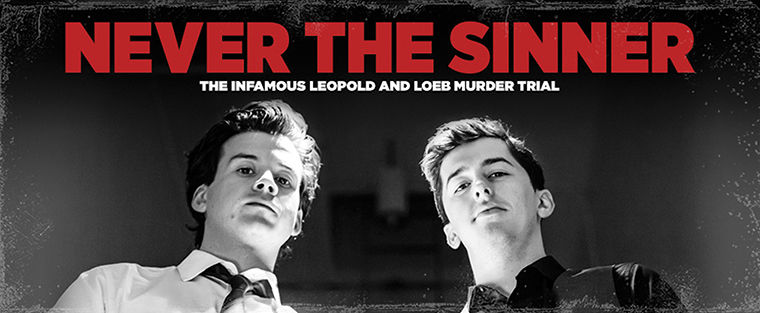‘Never The Sinner’ examines ‘Crime of the Century’
Courtesy Victory Gardens Theater
Playwright John Logan’s “Never The Sinner” premiered in Chicago in 1985 to critical acclaim.
November 9, 2015
“Never The Sinner,” a play by Tony Award winner John Logan detailing the 1924 murder trial of Nathan Leopold and Richard Loeb, began its run at the Victory Gardens Theater, 2433 N. Lincoln Ave., on Nov. 6.
Leopold and Loeb were University of Chicago students who came from prominent families. In 1924, they kidnapped and murdered 14-year-old Robert “Bobby” Franks in an attempt to demonstrate their intellectual superiority by committing what they deemed a “perfect crime.”
The pair murdered the boy in an attempt to actualize the philosophical concept of the “Superman” as envisioned by Friedrich Nietzsche, said Isaac Gomez, literary manager at Victory Gardens Theater and dramaturge for the play. The Superman was a goal that Nietzsche set for humanity, which entails the transcendence of traditional moral boundaries.
“In their effort to see if they can be above the law, they discover they are not supermen,” Gomez said.
According to Gomez, “Never The Sinner” draws its content from thousands of court documents, psychological examinations and letters exchanged between the two men. Certain crimes throughout history take on an iconic cultural significance characterizing the era when they occurred, said Leigh B. Bienen, senior lecturer at Northwestern University School of Law and co-author of the book “Crimes of The Century.”
“Somehow [Leopold and Loeb] not only captured the public imagination but became a huge media event,” Bienen said. “Memories about it linger on, people still talk about it, [and] people still wonder about how it happened.”
In the 1920s, crime was largely associated with the impoverished lower class, said Simon Baatz, a history professor at John Jay College of Criminal Justice and author of a book on the crime and its times, “For The Thrill of It.” The Leopold and Loeb case was shocking to the public because it contradicted preconceived notions about criminal activity and the wealthier, educated class, he said.
“In every single way, this crime seemed to go against every belief that middle-class society held dear,” Baatz said.
Gomez said “Never The Sinner” raises questions about who in society commits crimes and about the kinds of circumstances that motivate them to do so.
“[We examine] the ideas of privilege and how they function inside and outside of our criminal justice system,” he said.
However, Gomez said “Never The Sinner’s” unbiased exploration of Leopold and Loeb’s complex personalities and the feelings which led them to commit their crimes are far more important to the play’s impact and understanding of the broader significance of the event.
“There is something deep and profound [the playwright] does in crafting these young men that’s rooted in their romantic relationship,” Gomez said. “In a lot of artistic recreations, they don’t lean into that element as much.”
According to Gomez, the sentimentality of “Never The Sinner” does not intend to justify Leopold and Loeb’s crime but to aid in better understanding the circumstances that led them to commit it.
“Never The Sinner” is scheduled to run Nov. 6–Dec. 6 at Victory Gardens Theater. For more information, visit: www.VictoryGardens.org.








